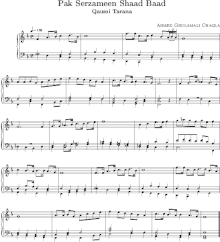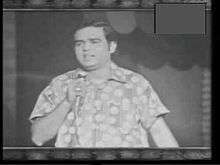Qaumi Taranah
The Qaumī Tarānah (Urdu: قومی ترانہ, pronounced [ˈqɔːmi ˈt̪əɾɑːnɑ], lit. ' "National Anthem"'), also known as Pāk Sarzamīn (پاک سرزمین, pronounced [ˈpɑːk ˈsəɾzəmiːn], lit. '"Thy Sacred Land"'), is the national anthem of Pakistan. It is written by Hafeez Jalandhari in 1952 and the music was produced by Ahmad G. Chagla in 1949, preceding the lyrics. Although in Urdu, the anthem has heavy Persian influence,[1] and only uses one exclusively Urdu word 'kā'.[2]
| English: National Anthem | |
|---|---|
| قومی ترانہ | |
 | |
National anthem of Pakistan | |
| Also known as | Pāk Sarzamīn (English: "Thy Sacred Land") |
| Lyrics | Hafeez Jalandhari, June 1952 |
| Music | Ahmed G. Chagla, 21 August 1949 |
| Adopted | 13 August 1954 |
| Audio sample | |
"Qaumī Tarānah" (instrumental)
| |

It was officially adopted as Pakistan's national anthem in August 1954[3] and was recorded in the same year by eleven major singers of Pakistan including Ahmad Rushdi, Kaukab Jahan, Rasheeda Begum, Najam Ara, Naseema Shaheen, Zawar Hussain, Akhtar Abbas, Ghulam Dastagir, Anwar Zaheer, and Akhtar Wasi Ali.[4]
History
In early 1948, A. R. Ghani, a Muslim from South Africa's Transvaal, offered two prizes of five thousand rupees each for the poet and composer of a new national anthem for the newly independent state of Pakistan. The prizes were announced through a government press advertisement published in June 1948. In December 1948, the Government of Pakistan established the National Anthem Committee (NAC) with the task of coming up with the composition and lyrics for the official national anthem of Pakistan. The NAC was initially chaired by the Information Secretary, Sheikh Muhammad Ikram, and its members included several politicians, poets and musicians, including Abdur Rab Nishtar, Ahmad G. Chagla and Hafeez Jullundhri. The NAC encountered early difficulties in finding suitable music and lyrics.
When President Sukarno of Indonesia became the first foreign head of state to visit Pakistan on 30 January 1950, there was no Pakistani national anthem to be played. In 1950, the impending state visit of the Shah of Iran added urgency to the matter and resulted in the government of Pakistan asking the NAC to submit a state anthem without further delay. The NAC Chairman, then Federal Minister for Education, Fazlur Rahman, asked several poets and composers to write lyrics but none of the submitted works were deemed suitable. The NAC also examined several different tunes and eventually selected the one presented by Ahmed G. Chagla and submitted it for formal approval.[5] On 21 August 1950, the Government of Pakistan adopted Chagla’s tune for the national anthem.[6]
The anthem, without lyrics, was performed for the first time for a foreign head of state on the state visit of the Shah of Iran to Pakistan in Karachi on 1 March 1950 by a Pakistan Navy band.
It was later played for Prime Minister Liaquat Ali Khan during his official visit to the United States on 3 May 1950. It was played before the NAC on 10 August 1950.[7] Official recognition to the national anthem, however, was not given until August 1954.[7] The NAC distributed records of the composed tune amongst prominent poets, who responded by writing and submitting several hundred songs for evaluation by the NAC. Eventually, the lyrics written by Hafeez Jullundhri were approved and the new national anthem was broadcast publicly for the first time on Radio Pakistan on 13 August 1954, sung by Hafeez Jullundhri himself. Official approval was announced by the Ministry of Information and Broadcasting on 16 August 1954. The composer, Ahmed G. Chagla, died in 1953, before the new national anthem was officially adopted. In 1955, there was a performance of the national anthem involving 11 major singers of Pakistan, including Ahmad Rushdi, Kaukab Jahan, Rasheeda Begum, Najam Ara, Naseema Shaheen, Zawar Hussain, Akhtar Abbas, Ghulam Dastagir, Anwar Zaheer and Akhtar Wasi Ali.[8]
Music
The "Qaumī Tarānah" is a melodious and harmonious rendering of a three-stanza composition with a tune based on eastern music but arranged in such a manner that it can be easily played by foreign bands.
The music, composed by the Pakistani musician and composer, Ahmad G. Chagla in 1949, reflects his background in both eastern and western music. Typically twenty-one musical instruments[6] and thirty-eight different tones[6] are used to play the "Qaumi Taranah",[9] the duration of which is usually around 80 seconds.[3][6][10]
Lyrics
Urdu original
The lyrics, written by the Pakistani Urdu-language poet, Hafeez Jullundhri in 1952, have commonality with Persian, rendering them mutually intelligible in both Urdu and Persian languages. No verse in the three stanza lyrics is repeated.[3] The lyrics have heavy Persian poetic vocabulary,[1] and only uses one exclusively Urdu word 'kā'.[2]
Nastaleeq script |
Roman Urdu |
ALA-LC transliteration |
Phonetic transcription (IPA) |
Paak sarzameen shaad baad |
Pāk sarzamīn shād bād |
[pɑːk səɾzəmiːn ʃɑːd̪ bɑːd̪] [pɑːjɪnd̪ɑ t̪ɑːbɪnd̪ɑ bɑːd̪ ‖] [dʒɑːnɪ ɪst̪ɪqbɑːl ‖] |
English translations
| Poetic translation[13] | Literal translation[14] |
|---|---|
May the holy land, stay glad; |
Blessed be the sacred land, |
Milestones
- 1947 – The new state of Pakistan came into being on 14 August.
- 1949 – Music for the Qaumī Tarānah is composed by the Pakistani musical composer, Ahmad G. Chagla (running time: 80 seconds).
- 1950 – anthem, without lyrics, was performed for the first time for a foreign head of state on the state visit of the Shah of Iran to Pakistan in Karachi on 1 March 1950 by a Pakistan Navy band.
- 1952 – Verses written by the Pakistani poet, Hafeez Jullundhri, are selected from amongst 723 entries.
- 1954 – Officially adopted as the national anthem and broadcast for the first time on Radio Pakistan on 13 August
- 1955 – Sung by 11 famous Pakistani singers including Ahmad Rushdi, Shamim Bano, Kokab Jehan, Rasheeda Begum, Najam Ara, Naseema Shaheen, Zwar Hussain, Akhtar Abbas, Ghulam Dastgir, Anwar Zaheer and Akhtar Wassi
- 1996 – Rendered in electric guitar for the first time by Pakistani rock band Junoon in their album Inqilaab
- 2009 – Rendered as an acoustic instrumental for the first time by Pakistani musician Jehangir Aziz Hayat
- 2011 – On 14 August, 5,857 people gathered in a stadium in Karachi to sing the Qaumī Tarānah and set a new world record for most people gathered to sing a national anthem simultaneously.[15]
- 2012 – On 20 October, 42,813 people gathered in a stadium in Lahore to sing the Qaumee Taraanah and set a new world record for most people gathered to sing a national anthem simultaneously, which was certified by Guinness World Records.[16] The record was subsequently broken on 26 March 2014 in Bangladesh.[17]
- 2017 – Coke Studio released a collaborative rendition of Qaumī Tarānah on 4 August by the featured artistes, to celebrate the 70 years of Pakistan in the tenth season.[18][19]
- 2019 – Gule Yaas Studio released a rendition of the Qaumī Tarānah sung and performed by Syed Imon Rizvi on 21 March 2019, to celebrate the 72 years of Pakistan.[20]
See also
| Wikisource has original text related to this article: |
Notes
- Transcriptions are based on sources from the articles Urdu, Help:IPA/Hindi and Urdu and Hindustani phonology. Therefore, the transcriptions aren't original research.
References
- Alex Vatanka. Iran and Pakistan: Security, Diplomacy and American Influence. I.B.Tauris. p. 14. ISBN 9780857739155.
- "The national anthem of Pakistan". Dawn. 13 August 2011. Retrieved 2 May 2019.
- "Information of Pakistan". Infopak.gov.pk. Archived from the original on 26 October 2007. Retrieved 31 January 2013.
- "Death Anniversary of Ahmed Rushdi". Duniya News. Archived from the original on 14 January 2016. Retrieved 1 September 2016.
- Michael Jamieson Bristow, National-Anthems.org. "Forty National Anthems". Archived from the original on 9 May 2006. Retrieved 12 April 2006.
- Aqeel Abbas Jafari (2010). Pakistan Chronicle (in Urdu) (1st ed.). 94/1, 26th St., Ph. 6, D.H.A., Karachi, Pakistan: Wirsa Publishers. p. 42. ISBN 9789699454004.CS1 maint: location (link)
- "National Anthem". Ministry of Information and Broadcasting, Government of Pakistan. Archived from the original on 26 October 2007. Retrieved 29 November 2007.
- Mazhar Iqbal, Mazhar.dk. "Ahmad Rushdi". http://mazhar.dk/film/singers/ahmadrushdi/. Retrieved 12 April 2006.
- Mazhar Iqbal, Mazhar.dk. "National Anthem of Pakistan". Retrieved 12 April 2006.
- Information Ministry, Government of Pakistan. "Basic Facts". Archived from the original on 13 April 2006. Retrieved 12 April 2006.
- https://www.modablaj.com/songLine/179300/پاک-سرزمین-شاد-باد#line-1
- https://www.nationstates.net/page=dispatch/id=915097
- Pasha, Muhammad A. English Composition (Part II). Lahore: Command Publications.
- https://sourcebooks.fordham.edu/india/anthem-pakistan.asp
- "Pakistan creates new anthem record". The Express Tribune. 12 August 2011. Retrieved 1 January 2012.
- "Pakistan reclaims anthem singing record". The News. Retrieved 31 January 2013.
- "Pakistan Record Broken". Guinness World Records. Retrieved 26 March 2014.
- Rafay Mahmood (4 July 2017). "Exclusive: Coke Studio 10's line-up will leave you starstruck". The Express Tribune. Retrieved 4 July 2017.
- Coke Studio (4 August 2017). "The National Anthem of Pakistan". Retrieved 4 August 2017 – via YouTube.
- Gule Yaas Studio (21 March 2019). "The National Anthem of Pakistan". Retrieved 21 March 2019 – via YouTube.
External links
| Wikimedia Commons has media related to: |
- Pak Sar Zameen Shad Bad Lyrics
- Pakistan: Qaumī Tarānah – Audio of the national anthem of Pakistan, with information and lyrics
- Ministry of Information and Broadcasting, Government of Pakistan. "National Anthem". Archived from the original on 26 October 2007. Retrieved 9 December 2007.
- National Anthem of Pakistan
- Pakistan National Songs